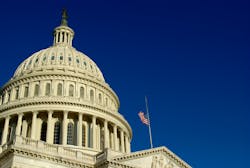House passes infrastructure bill with petrochemical taxes; methane tax, higher royalties, fees may follow
The House passed a $1 trillion infrastructure bill Nov. 5 with revived Superfund excise taxes on petrochemicals along with a range of spending approvals for improvements in ports, roads, waterways, and other basic infrastructure.
The vote on H.R. 3684 was 228-206, with support from only 13 Republicans and opposition from only six Democrats. That sent the bill to the White House, where President Biden said he would sign it.
Next may come the far costlier budget bill, devoted to social spending and climate change policy. As it now stands, the budget bill is expected to include a big tax on methane emissions and a big increase in royalties and fees for oil and gas from federal lands.
The infrastructure bill had been held up for more than 2 months as many activist legislators in the left wing of the Democratic Party insisted they would oppose it unless it were tied to an ambitious, very costly budget bill, named the Build Back Better Act.
The activists finally gave way Nov. 5 after winning a procedural vote that set the stage for future action in the very near future on the budget bill. That compromise allowed the infrastructure bill’s final vote near midnight on Friday.
Taxes on chemicals
The infrastructure bill includes taxes on all production and imports of many chemicals, including 10 of the most common petrochemicals: methane, butane, benzene, toluene, xylene, ethylene, propylene, butadiene, butylene, and acetylene. The rates would be $9.74/ton for all except methane, whose rate would be $6.88/ton.
The $9.74 rate would be double the previous rates, which were in effect from the mid-1980s to the mid-1990s under authority of the Comprehensive Environmental Response, Compensation and Liability Act, better known as the Superfund law.
The American Chemistry Council issued a Nov. 5 statement lamenting revival of the excise taxes. The council said it was “dismayed that the package imposes new Superfund excise taxes on 42 chemicals, critical minerals, and metallic elements—materials used in manufactured goods, including those needed for infrastructure development and climate progress. Electric vehicle infrastructure, renewable energy, advanced coatings, energy-efficiency solutions, and water delivery and purification would be affected.”
The National Ocean Industries Association (NOIA) welcomed the bill’s $17.4 billion in funding for ports, other coastal infrastructure, and inland waterways. NOIA’s members not only rely on coastal infrastructure in their offshore oil and gas work but can hope such infrastructure in the building and maintenance of offshore wind farms, if and when such plans come to fruition.
Budget bill next
The price tag for the pending budget bill is roughly estimated at $1.75 trillion, but it could be far higher, according to independent estimates. Moderate Democrats agreed to vote on the bill no later than Nov. 15 but first want a new cost or "scoring" estimate for the bill from the Congressional Budget Office.
The new CBO estimate could indicate eye-popping total costs, a further cause for Democrats’ in-party fighting over the bill.
The current content of the bill, reshaped over many weeks by House Democrats, has not been released to Republicans, much less to the public. Even Senate Democrats have been saying they do not know what is in it. But some elements have been released, and they will make oil and gas executives uncomfortable.
The bill will reform royalties and fees for oil and gas from federal lands, according to a Nov. 5 statement from the House Budget Committee. The budget panel did not specify rates. But when the House Natural Resources Committee in September contributed that piece to the budget bill, it specified a minimum of 20% federal royalties, up from the current 12.5%, and it added a raft of other fee increases and new fees on oil and gas from public lands (OGJ Online, Sept. 10, 2021).
The House Budget Committee also said the bill will block further oil and gas drilling in the Arctic National Wildlife Refuge and in the Pacific, Atlantic, and eastern Gulf of Mexico waters.
The planned methane emissions tax, when last specified for the public, was pegged at $1,500 per ton of emissions exceeding two-tenths of 1% of gas sent for sale. The amount was chosen because was within the range of estimates for the “social cost of methane,” meaning the various health and other costs of methane emissions.
That “natural gas tax” will increase energy bills for families by at least 12%, according to Karen Harbert, president of the American Gas Association.
The American Petroleum Institute (API) estimated it will result in as much as $9.1 billion in negative impacts on the US economy, including the loss of up to 90,000 jobs.
“The structure is all wrong,” said Frank Macchiarola, API senior vice-president of policy, economics, and regulatory affairs. The best way to reduce methane emissions would be through the regulatory process, with direct regulation for both new and existing sources taking into account best methods and technologies, Macchiarola said in October.
